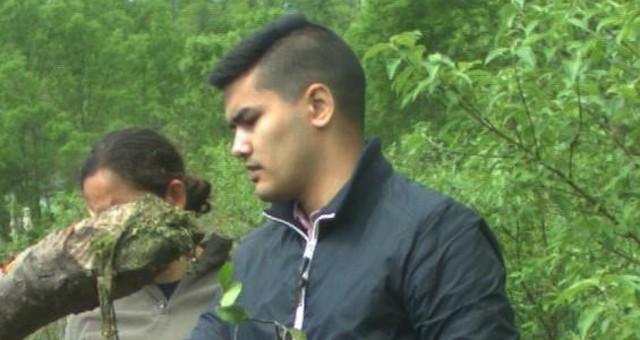Fall 2016 to Spring 2018
Effects of seasonality on the foraging patterns of the North American beaver, Castor canadensis, at Rice Creek Field Station
My research here at Rice Creek is focused on the effects of seasonality on the foraging patterns and movements of the North American Beaver, Castor canadensis. In seasonal habitats, where the dispersion and abundance of resources exhibit significant variation, animals are forced to either migrate, hibernate, or modify their behavior in order to maximize energetic returns. Even though seasonality affects aquatic and terrestrial environments differently, our current understanding of the effects of seasonality on the foraging behavior of semiaquatic animals, such as the North American beaver (Castor Canadensis), have remained relatively unstudied. As ecological engineers with the ability to modify and expand aquatic ecosystems, beavers are crucial in our comprehensive understanding of freshwater habitats, and by studying their behavior we will be able to gain greater insight into the long-term management of these systems.
I have been a research assistant to a couple of different professors since I first entered Oswego in 2014, and I am thankful to have already learned so much on how to conduct research in the lab and the field, using a range of equipment and methods across both plant and animal studies. Taking on this ambitious project, however, has certainly taught me major lessons on how to spearhead research and research problems head on, as well as how to organize my resources and balance my time, no matter the obstacles I may face. I will certainly take my experiences with this project and use them to learn and hopefully perfect any future studies I might do.
My most memorable research experience at Rice Creek Field Station occurred in the fall of 2015 when I assisted another student researcher. This was the first field research I had ever done, and for several weeks I would help in setting and checking small mammal traps, as well as setting up and performing behavioral experiments. This was the first real, hands-on experience with zoology I ever had, and for that I will never forget it. It was certainly a little messy, and waking up at 6am was not amazing, but it was definitely a lot of fun and helped me realize my long-term goals as a zoologist.
I grew up in the agricultural valleys of Central New York, just outside the town of Cobleskill. For as long as I can remember I have been incredibly curious about the natural world and how it works. As a child I would spend hours looking through wildlife encyclopedias and watching every nature documentary I could get my hands on – ultimately developing a strong fascination with the animal kingdom and its vast diversity. This passion has stuck with me ever since, and I am so grateful that I have had the chance to explore some of the endless zoological opportunities provided by Oswego and Rice Creek throughout my college career.
In the fall of 2018, I plan to begin graduate school at the University of Michigan or Ohio State University. I will be studying mammal behavior/biopsychology, and I am very much excited to see where this takes me in the future. In regard to the long-term, I see myself possibly as a professor or even doing conservation work. I do believe teaching is incredibly important and rewarding, and conservation is more than necessary to ensure the natural beauty in a world where it is too often forgotten. Nevertheless, as long as I get to work with animals (and hopefully make a difference) I am sure I will be happy.



